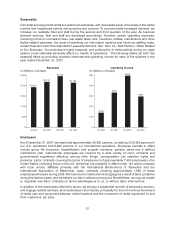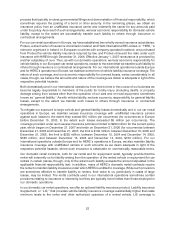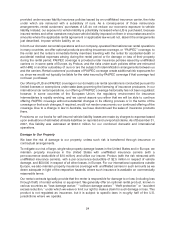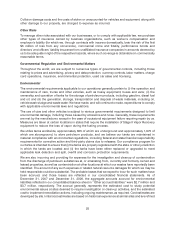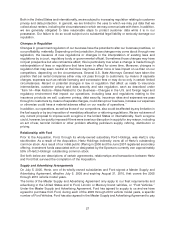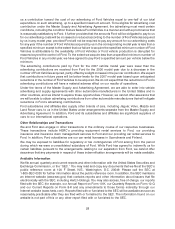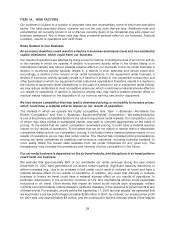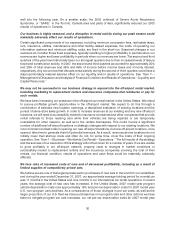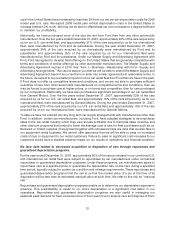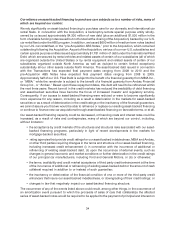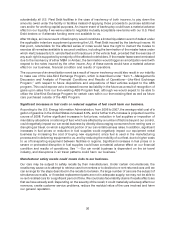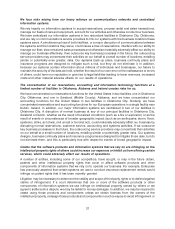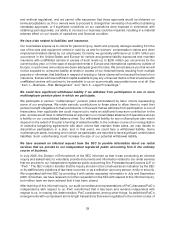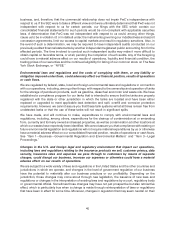Hertz 2007 Annual Report Download - page 51
Download and view the complete annual report
Please find page 51 of the 2007 Hertz annual report below. You can navigate through the pages in the report by either clicking on the pages listed below, or by using the keyword search tool below to find specific information within the annual report.cars in the United States have increased by less than 3% from our net per-car depreciation costs for 2006
model year U.S. cars. We expect 2008 model year vehicle depreciation costs in the United States to
increase between 2% to 4%. We may not be able to offset these car cost increases to a degree sufficient
to maintain our profitability.
Historically, we have purchased more of the cars we rent from Ford than from any other automobile
manufacturer. Over the five years ended December 31, 2007, approximately 40% of the cars acquired by
us for our U.S. car rental fleet, and approximately 31% of the cars acquired by us for our international
fleet, were manufactured by Ford and its subsidiaries. During the year ended December 31, 2007,
approximately 24% of the cars acquired by us domestically were manufactured by Ford and its
subsidiaries and approximately 25% of the cars acquired by us for our international fleet were
manufactured by Ford and its subsidiaries. Under our Master Supply and Advertising Agreement with
Ford, Ford has agreed to develop fleet offerings in the United States that are generally competitive with
terms and conditions of similar offerings by other automobile manufacturers. The Master Supply and
Advertising Agreement expires in 2010. See ‘‘Item 1—Business—Relationship with Ford—Supply and
Advertising Arrangements.’’ We cannot assure you that we will be able to extend the Master Supply and
Advertising Agreement beyond its current term or enter into similar agreements at reasonable terms. In
the future, we expect to buy a smaller proportion of our car rental fleet from Ford than we have in the past.
If Ford does not offer us competitive terms and conditions, and we are not able to purchase sufficient
quantities of cars from other automobile manufacturers on competitive terms and conditions, then we
may be forced to purchase cars at higher prices, or on terms less competitive, than for cars purchased
by our competitors. Historically, we have also purchased a significant percentage of our car rental fleet
from General Motors. Over the five years ended December 31, 2007, approximately 22% of the cars
acquired by us for our U.S. car rental fleet, and approximately 15% of the cars acquired by us for our
international fleet, were manufactured by General Motors. During the year ended December 31, 2007,
approximately 27% of the cars acquired by our U.S. car rental fleet, and approximately 15% of the cars
acquired by us for our international fleet, were manufactured by General Motors.
To date we have not entered into any long-term car supply arrangements with manufacturers other than
Ford. In addition, certain car manufacturers, including Ford, have adopted strategies to de-emphasize
sales to the car rental industry which they view as less profitable due to historical sales incentive and
other discount programs that tended to lower the average cost of cars for fleet purchasers such as us.
Reduced or limited supplies of equipment together with increased prices are risks that we also face in
our equipment rental business. We cannot offer assurance that we will be able to pass on increased
costs of cars or equipment to our rental customers. Failure to pass on significant cost increases to our
customers would have a material adverse impact on our results of operations and financial condition.
We face risks related to decreased acquisition or disposition of cars through repurchase and
guaranteed depreciation programs.
For the year ended December 31, 2007, approximately 50% of the cars purchased in our combined U.S.
and international car rental fleet were subject to repurchase by car manufacturers under contractual
repurchase or guaranteed depreciation programs. Under these programs, car manufacturers agree to
repurchase cars at a specified price or guarantee the depreciation rate on the cars during a specified
time period, typically subject to certain car condition and mileage requirements. These repurchase and
guaranteed depreciation programs limit the risk to us that the market value of a car at the time of its
disposition will be less than its estimated residual value at such time. We refer to this risk as ‘‘residual
risk.’’
Repurchase and guaranteed depreciation programs enable us to determine our depreciation expense in
advance. This predictability is useful to us, since depreciation is a significant cost factor in our
operations. Repurchase and guaranteed depreciation programs are also useful in managing our
seasonal peak demand for fleet, because some of them permit us to acquire cars and dispose of them
31


